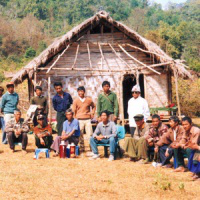Burma: villagers forcibly moved to make way for new dam

Villagers in a rural part of Burma.
Thousands of villagers in the north of Burma (Myanmar) are being forcibly moved from their homes to make way for a new hydro-electric dam. Up to 10,000 people in Kachin State will be displaced and 47 villages will disappear beneath the waters following construction of the Myitsone dam - which will create a lake some 300 square miles, almost the size of New York City.
The construction of a number of new dams in the state is a key factor that sparked fighting between the Burmese Army and the Kachin Independence Army last month (June), following demands for greater independence from the predominantly Christian Kachin State.
Aid to the Church in Need, the charity for persecuted and other suffering Christians, was told by villagers from Tang Hpre they had been forced out of their village by state authorities.
One villager said: "They arrived with 10 trucks, large numbers of police, and government representatives from Myitkyina [the capital of Kachin State]".
Another said: "We were forced to abandon our homes - and yet this has been our land for generations."
Up to 130 families were resettled to the newly constructed village of Aung Min Thar, 6.5 miles (10 km) to the south, in March.
One catechist from Tang Hpre said: "We cannot leave the land and houses that belonged to our forefathers." Tang Hpre is where the Columban Missionaries started their work in Burma and the order built a church and schools there after World War II.
Compensation from those building the dam for the relocation consisted of a new house, a television, the equivalent of US$100 and six months supply of rice. However according to eye witnesses the buildings in Aung Min Thar resembled "temporary shelters".
The construction of the hydro-electric dam is being carried out with the backing of a consortium of Burmese and Chinese companies and is expected to supply up to 6,000 megawatts of power each year, mostly to the Chinese market.
Also among those to be affected by the construction of the new dam is the Malizup Weavers' Cooperative. Set up by a Catholic Religious Sister, this group of mostly elderly woman from the Jinghpaw (or Jingpo) tribes have been working together since February 2008. The Jinghpaw tribal groups are Christian.
Weaving is a traditional handicraft and the success of this cooperative has given the Jinghpaw a new sense of self-esteem. They reported that it made it easier to sell their produce and led to a greater respect for their ethnic group's unique culture. There are fears that these achievements could be threatened by being forced to abandon their homes.
The Burmese government ignored calls from representatives of all the Christian denominations in the region to abandon their plans. In February they protested against the Myitsone dam project, asking the government to stop construction work. The dam is being constructed just below the point where the Mali and the Nmai rivers converge to become the Irrawaddy.
Source: ACN


















